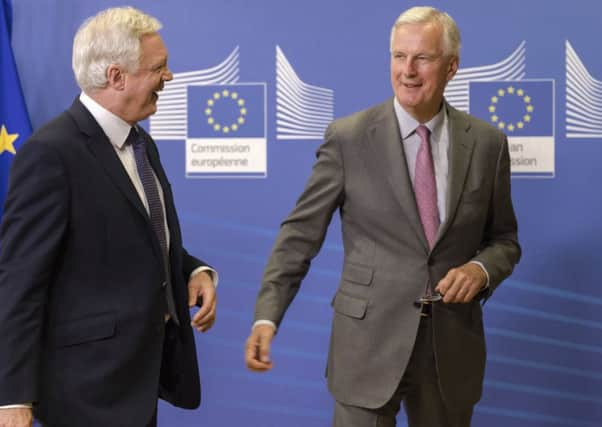Why the UK might not be on track to leave the EU by April 2019


“Brexit means Brexit” is still the refrain, as the details have not yet been ironed out with the remaining nations of the European Union on the terms of any deal.
The notion of a “Brexit Bill” is a rather reductive, if effective, way to refer to the series of payments that the UK could be expected to make during any transitional period.
Advertisement
Hide AdAdvertisement
Hide AdTriggering Article 50 means that the UK is now set to formally end our decades-long membership of the EU on April 1 of 2019.
However, a number of issues are still arising as the complicated negotiations get underway, which could put that auspicious date in doubt.
Infrastructure concerns
A ‘thread’ of linked tweets went viral yesterday as it appeared to raise legitimate issues with how well, or otherwise, the UK is prepared for its looming departure.
In it, Twitter user Jonny Morris muses that the UK is set to leave the EU, the single market, and the free movement area, amongst a host of agencies in around 20 months.
He notes that we will need new agencies and some new border checks, perhaps even at the land border between the UK and the Irish Republic.
He asks: “Why isn’t Dover a big building site? We will need to massively increase customs capacity. Where are the buildings being built, bought or leased for our new agencies?”
Morris’ conclusion that the Government is either incompetent or determined to somehow avoid leaving the EU remove some of the necessary nuance from the issue.
However, it does belie some of the difficulties that lie at the heart of an approach to the post-Brexit landscape that everything will iron itself out.
Advertisement
Hide AdAdvertisement
Hide AdEuropean diplomats have privately expressed disbelief at what they perceive as the lack of planning among their UK equivalents.
‘Remoaners’ ramping up pressure
There still remains little appetite for a second referendum on the terms of Brexit to be submitted to UK voters.
It was a key plank of the Liberal Democrat manifesto at the General Election in June, but the party didn’t make the gains it was expecting, only keeping the same number of seats in Parliament off the back of an anti-SNP vote in Scotland.
However, a number of politicians are emboldened by what they see as a gap in the market to represent either regretful Brexit backers or ardent remainers to challenge broken promises from Leave politicians.
The potential power of that grouping was underlined today when it was revealed that the UK’s net contribution to the European Union worked out at around £156m per week.
Sharp readers will note that this figure is far less than the famous £350m that the official Leave campaign made a key plank of their messaging.
Chukka Umuna, a Labour moderate and key figure in ‘Vote Leave watch’, said: “Those people who voted to quit the EU because they thought leaving the EU would deliver a cash boost for the NHS are going to be left disappointed.”
If more powerful politicians get on board with similar campaigns, and more of the Leave campaign’s questionable maths comes to light, the Brexit process could be further delayed.
Political Instability
Advertisement
Hide AdAdvertisement
Hide AdThis doesn’t just apply to Theresa May’s ‘strong and stable’ mantra giving way to ‘weak and wobbly’.
Ten DUP MPs have given the Prime Minister some breathing room, but it seems like only a temporary reprieve as few, if any, of her MPs expect the former Home Secretary to lead the party through the entire Brexit process to the next general election.
It is also easy to forget that the remaining 27 EU countries have to ratify any deal that is made with Britain on their behalf by negotiators.
There are few who can claim to be experts on all of those countries’ political situations, but it is safe to say that any deal will have a tough time navigating through over two dozen national legislatures.
Both sides in the negotiations, the EU and the UK, have to agree to any extension of the process for the UK’s official departure.
Siren voices on the Leave side will howl betrayal, but it could simply be a matter of practicalities, and the less information we get from the UK Government, the less likely the April Fools Day departure date looks.